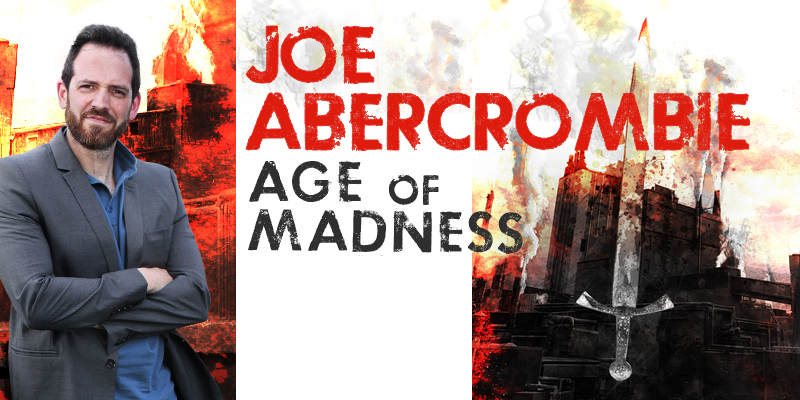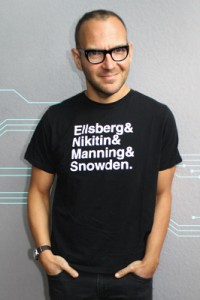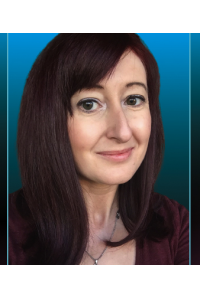Joe Abercrombie: Age of Madness

Joseph Edward Abercrombie was born December 31, 1974 in Lancaster, England. He attended Manchester University, where he studied psychology. He worked at a TV post-production company and as a film editor before becoming a full-time writer. He was a finalist for the John W. Campbell Award for Best New Writer in 2008.
His debut The Blade Itself (2006) was shortlisted for the Compton Crook Award for best first novel, and launched The First Law trilogy, which continued with Before They Are Hanged (2007) and Legend Award finalist Last Argument of Kings (2008). His next books were standalones set in the same world: revenge novel Best Served Cold (2009), war novel The Heroes (2011), and western novel Red Country (2012); all three were British Fantasy Award finalists and Legend Award finalists. A collection of stories, World Fantasy Award finalist Sharp Ends (2016), features stories from that world.
Next came the YA Shattered Sea trilogy, in a new world inspired by Viking culture: Locus Award winner Half a King (2014), Half the World (2015), and Half a War (2015). He has returned to the First Law setting with his new trilogy, The Age of Madness, starting with A Little Hatred (2019).
Abercrombie lives in Bath with his wife Lou, daughters Grace and Eve, and son Teddy.
Excerpts from the interview:
“Growing up, I played a lot of roleplaying games and read a lot of commercial fantasy of that ’80s and ’90s period – the shiny, heroic fantasy that was in vogue at that time. I read all kinds of other stuff as well, from classics like Dickens and Jane Austen – my mum was an English teacher, so she always had me reading widely, discussing books and talking about how they worked, and digging into the guts of them from an early age. Fantasy wasn’t her thing, but she would never have been prescriptive. She wanted me to read whatever I liked, but she also wanted me to read things she loved, and the opportunity to discuss books with her was great because she had quite an insight. We’d read A Christmas Carol at Christmas, and she’d talk about how the sentence structure worked – just very naturally, it wasn’t a big lesson, but that sort of analysis was always there. She would read poetry to us and encourage us to think about rhythm and word choice and all those things. I don’t write poetry, though I’ve stooped to some really poor blank verse at times, almost as a bit of a joke within the books – the characters visit a play at one point, so there’s some blank verse in there, cod Shakespeare stuff. I don’t consider myself a poet at all, but studying poetry and understanding how you reduce things to the absolute minimum number of words is a useful area to be aware of and understand – even for someone who writes giant, over-bloated books. That’s what I respond to in books – the powerful voice and the brevity in summing things up in a quick and rhythmic sort of package. Those are the things I like to read, so that’s what I try to do.
“There’s a writer you may not have heard of, called J.R.R. Tolkien. Almost unknown, these days. As with everyone, I’m sure, I started with The Hobbit and was gripped by that. By the age of ten or so I was very into The Lord of the Rings, and I would read it every year around Christmastime. Tolkien was always just there – looming, whether you read fantasy or not. It was the big thing. He bestrode the genre like a colossus. I started looking for other things and came upon A Wizard of Earthsea by Ursula K. Le Guin, and found that magical and fascinating because it was such a different approach to Tolkien. Then I started reading a lot of Michael Moorcock, Elric, and obviously saw a very different kind of approach to morality in those books, much more of a sword-and-sorcery kind of ethos. Those three were the foundational fantasy writers for me.
“Then I started to read a lot of stuff like David Eddings and Dragonlance, that sort of commercial fantasy in the ’80s and ’90s, and just would tear through heaps of those books and loved them. I started to feel they were plowing the same furrow over and over and becoming a bit predictable. I started reading much more widely – thriller writers, guys like Elmore Leonard and James Ellroy – and I was fascinated by that rough, noir, tough kind of voice. It was very different to the sort of prose I’d seen in fantasy. They’re about the hook, and being in the character’s head. That really close association with their thoughts is unlike Tolkien, who has quite a distance in his narration. He’s above the events, and sees what he needs to see, but you’re not often in Aragorn’s thoughts – whereas a writer like James Ellroy is all about the personal experience of a limited cast. I was fascinated by the contrast between that approach to visceral thriller writing and the more dignified, standoffish approach I saw in fantasy, and from an early age I wondered if you could knit those two together. I wasn’t quite getting the fantasy I would have liked to see. Then I read A Game of Thrones in the ’90s, and that was exactly that thing.
“I started writing seriously when I was finishing my university career. I’d done a psychology degree, so I had no skills, and I needed something to get me into the workplace, so I thought I’d teach myself to touch-type. As an exercise in touch typing, I thought, ‘I’ll write that take on epic fantasy that’s been on my mind for many years.’ I had all these ideas for the First Law world going back a long time, right into childhood, and as I grew up, they got a little bit more adult. When I first started trying to write the book in my very early twenties, it was much more pompous and classically heroic – tapping into Tolkien, and I was taking myself and the genre a lot more seriously than I did later. This was before I read A Game of Thrones, and before I’d done some work and some growing up. It was standard fantasy stuff, with the same characters and same setting, but lacking the tone and the wit. I put it aside until I was working as a film editor, maybe seven or eight years later. I was freelance and had time on my hands, and I needed some project to do in my time off. I started trying to write again, and it was the same characters, but straight away there was this different tone to it – world weary, tongue-in-cheek – and the characters felt much more real and interesting, right from the start. They had their own voices, and I was interested in exploring that. It was huge fun to start experimenting with scenes, and to think about what to describe, what to use in thought, what in dialogue. I got really into writing scenes, and I’d write a paragraph and go over and over that paragraph. My habit of looking at how things were constructed made me pull my own stuff apart and rethink it. I just spent a lot of time going over a few scenes until I felt like I was starting to understand how the whole thing works.
“Right from that moment, I felt writing was something I was going to do – even as a hobby, not necessarily in a professional, successful way. A key point was admitting to friends and family that I was doing it. That was a big step, because I was very secretive to begin with. I was writing in the middle of the night, between 12 and 4 in the morning. I was very secretive and worried about it. Eventually I worked up the courage to tell people I was writing, and showed my mum and my dad. They say you should never take your family’s opinions too seriously because they’ll be too gentle and supportive, but my mum was, and remains, a positive and creative but ruthless critic. She read some of it and said, ‘Joe, this is not as bad as I thought it would be.’ I knew I was on to something. But she had a lot to say on the detail, the sentence structure, the way I was using images, and the way I was doing dialogue. Her main thing was that you have to be truthful. When I’d use some fancy metaphor about the sky being like a sable cloth or something like that, she’d say, ‘Is it, though? Is it like that?’ Whenever you write that way, you’ve got to ask yourself, ‘Is this true or is it just cliché bollocks that fills the space?’ Even the most cliché setups and characters will become new if you’re always asking yourself, ‘Is this true?’ I started writing as much to discuss it with my mum, and my dad, who was much more into the macro side of plotting and the progression of the characters. When I had a chunk of four or five chapters, they’d read them and we’d discuss them, and that became an enjoyable and interesting hobby. Within a couple of years, I had a book, or something like a book, and started revising and rethinking it. By that point I’d started planning more carefully and thinking, ‘What am I doing with this whole thing?’ Eventually I had a book and thought, ‘I’ll send it off to some agents and see if anyone likes this rubbish.’
“It took a while to sell the first book. I’ve always been very structured. When I did a degree, I looked at all the previous papers and found out what the most likely questions were and prepared the three most likely answers, and was very structured in my approach to things. And likewise in trying to get published. I got the Writers’ & Artists’ Yearbook and looked up the agents. I found the half a dozen agents who fitted the sort of book I’d written, and who represented similar kinds of writers. I followed all the advice – and no one was interested. I was prepared for ‘No,’ but I wasn’t prepared for the total silence and indifference. This was before email, so you’d send off your envelope with a self-addressed stamped envelope included for their reply, and six weeks later you’d open the front door and there would be your own envelope, and you’d know, ‘Shite. They said no.’ That happened a few times, and usually there’d be a photocopied rejection slip saying something like, ‘This book/magazine/ story is not appropriate for us at this time, but may be appropriate for another publisher/agent at another time.’ Photocopied signature. I was expecting powerful rejections, like, ‘We dislike your book intensely because it rouses powerful emotions within us that we do not like,’ not just simple, ‘Nah.’ But that’s what you get, generally. ‘Nah.'”
Interview design by Francesca Myman. Photo by Arley Sorg.
Read the full interview in the January 2020 issue of Locus.
 While you are here, please take a moment to support Locus with a one-time or recurring donation. We rely on reader donations to keep the magazine and site going, and would like to keep the site paywall free, but WE NEED YOUR FINANCIAL SUPPORT to continue quality coverage of the science fiction and fantasy field.
While you are here, please take a moment to support Locus with a one-time or recurring donation. We rely on reader donations to keep the magazine and site going, and would like to keep the site paywall free, but WE NEED YOUR FINANCIAL SUPPORT to continue quality coverage of the science fiction and fantasy field.







